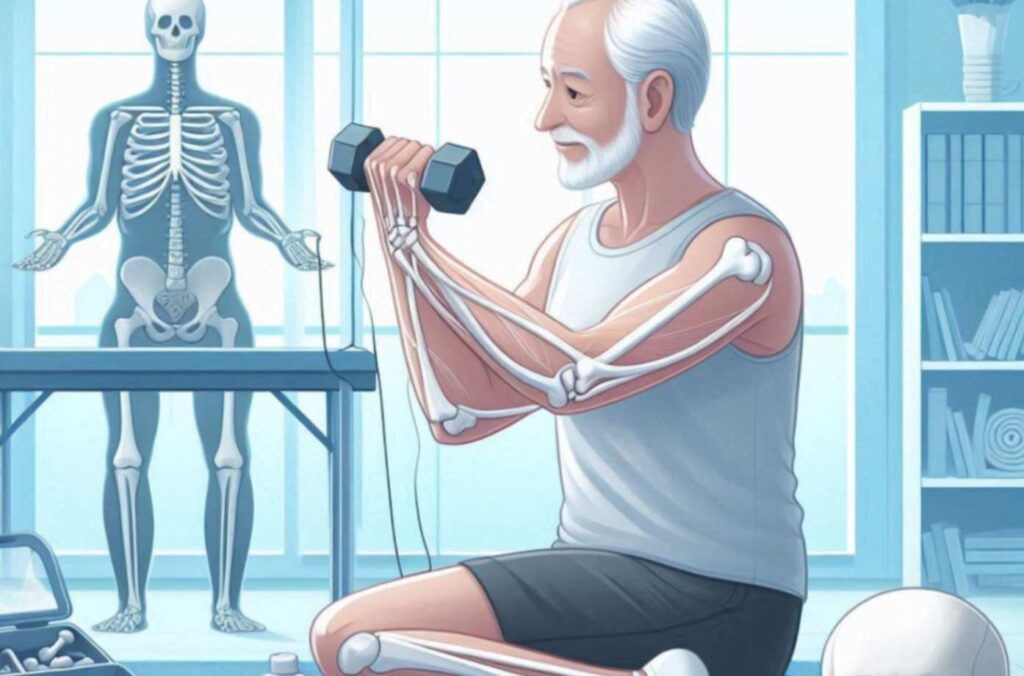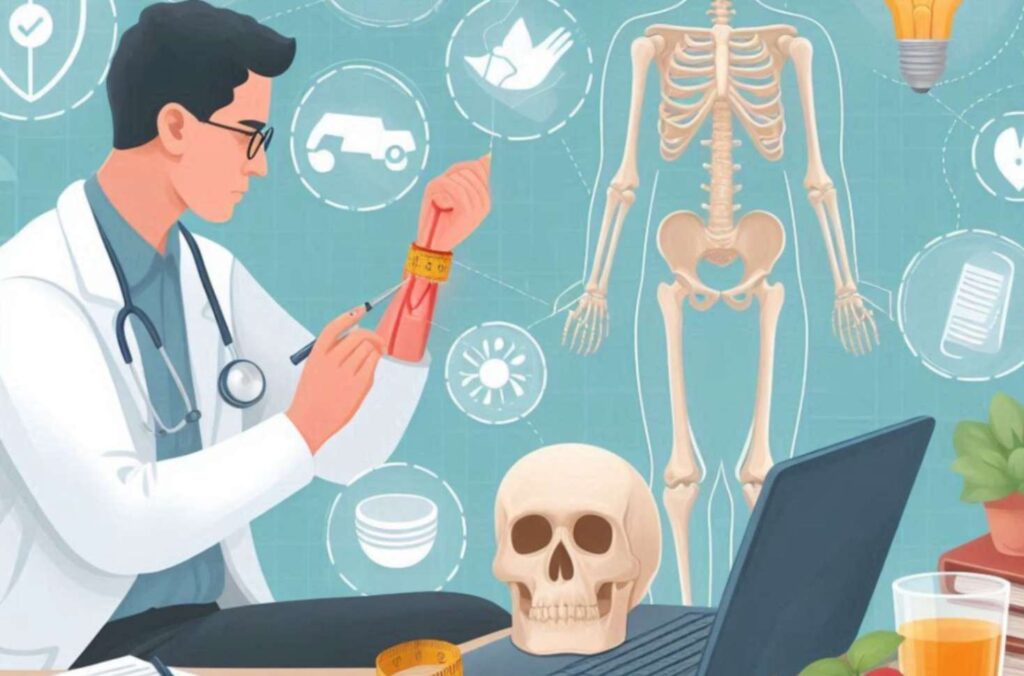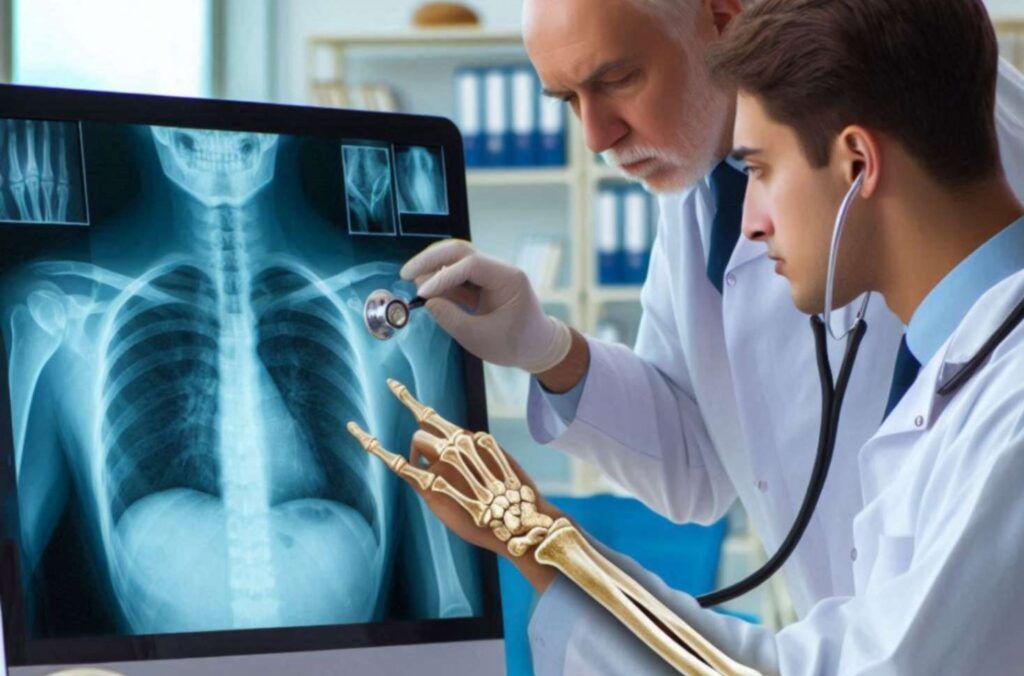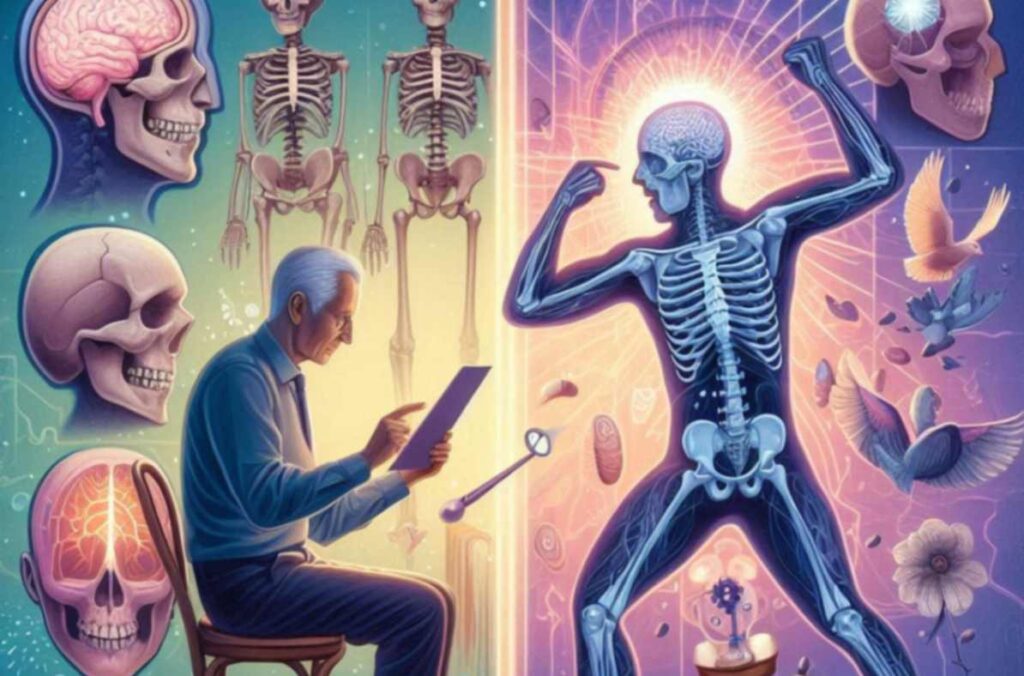Bones weakened by osteoporosis are more vulnerable to fractures and other injuries. Effectively managing this condition is essential for improving your quality of life. In this Article, we’ll discuss five crucial self-care strategies that can strengthen your bones and contribute to a healthier lifestyle. Discover valuable tips to enhance your bone health by continuing to read.
Nutrition: Building Strong Bones from the Inside Out:
Calcium-Rich Foods:
Including calcium-rich foods in your diet is crucial for strong bones. Dairy products like milk, cheese, and yogurt, as well as leafy greens such as kale and broccoli, provide essential calcium for bone health.
Sources of Vitamin D:
Vitamin D is essential for calcium absorption and bone health. It can be obtained from sunlight as well as dietary sources like fatty fish and fortified foods.

Magnesium-Rich Foods:
Magnesium helps build and maintain bone density. Whole grains, beans, nuts, and seeds are good suppliers of this mineral. By including these foods in your diet, you can maintain the strength and integrity of your bones and encourage bone health.
Protein for Bone Health:
Building and mending bone tissue require protein. Lean meats, poultry, fish, eggs, beans, and tofu are examples of protein-rich foods. A sufficient protein consumption helps preserve muscle mass and promotes bone health, which lowers the risk of osteoporosis and fractures.
Exercise: Strengthening Bones and Muscles:
Weight-Bearing Exercises:
Incorporating regular weight-bearing exercises into your routine, like walking, jogging, or hiking, can significantly boost bone health. These activities trigger bone formation and enhance bone density by exerting stress on the bones, gradually strengthener them.
Strength Training:
Integrating strength training routines like weightlifting or resistance band workouts into your schedule not only enhances muscle mass but also boosts bone density. Strengthened muscles offer improved stability for your bones, minimizing fracture risks and enhancing overall physical performance.
Flexibility and balance:
Engaging in practices such as yoga and tai chi can significantly enhance flexibility, agility, and balance, all of which are essential for reducing falls and lowering the risk of fractures. These gentle yet effective exercises are especially advantageous for seniors, empowering them to preserve independence and feel more secure in their mobility.

Tailored Exercise Program:
Seek guidance from a healthcare provider or a qualified fitness instructor to craft a tailored exercise regimen tailored to your specific requirements and capabilities. Beginning with a slow pace and progressively ramping up the intensity of your workouts can prevent injuries while optimizing the advantages for your muscles and bones.
Variations in exercise routines:
Blend a mix of exercises into your daily regimen, encompassing weight-bearing, strength training, flexibility, and balance exercises, to address various facets of bone health. Consistently integrating exercise into your lifestyle can fortify your bones, enhance overall fitness, and lower the possibility of fractures related to osteoporosis.
Lifestyle Modifications: Reducing Risk Factors:
Quit Smoking:
Smoking can reduce bone strength and raise the risk of fractures. Quitting smoking is essential for maintaining optimal bone health. Reach out to healthcare providers or join support groups for assistance in achieving successful smoking cessation.
Limit alcohol consumption:
Overconsumption of alcohol can have harmful effects on bone strength. Adhering to moderate drinking recommendations—limiting intake to one drink per day for women and up to two drinks per day for men—can promote optimal bone health.
Maintain a Healthy Body Weight:
Being underweight increases osteoporosis risk, while obesity can also affect bone health. Aim for a balanced diet and regular exercise to maintain a healthy weight.

Fall prevention:
Ensure your home is safe to avoid falls by enhancing lighting, eliminating tripping hazards, and utilizing assistive tools. Incorporating regular exercise into your routine is also beneficial, as it enhances balance and strength, lowering the risk of falls.
Regular bone density testing:
Frequent bone density assessments, like a DEXA scan, are essential for tracking bone health and identifying osteoporosis early on. Observe the testing frequency guidelines made by your healthcare provider.
Adequate intake of calcium and vitamin D:
To maintain the health of your bones, make sure you’re consuming enough calcium and vitamin D. Include foods high in calcium and vitamin D in your diet, or consider taking supplements if needed. Consult your healthcare practitioner for advice specific to your situation.
Regular medical check-ups: Monitoring of bone health:
Regular medical appointments are crucial for individuals managing osteoporosis, ensuring their bone health receives proper attention. These check-ups usually encompass a range of elements:
Bone Density Tests:
Bone density assessments, commonly conducted using a dual-energy X-ray absorptiometry (DEXA) scan, gauge bone mineral density and forecast fracture likelihood. Your healthcare practitioner might advise these evaluations at particular intervals, considering factors like age, gender, medical background, and treatment outcomes.
Medication Administration:
Medication is a common part of managing osteoporosis since it helps reduce bone loss and fractures. Your medical professional will keep an eye on you and modify your treatment as necessary. Bisphosphonates, SERMs, and monoclonal antibody treatments are common drugs.

Lifestyle Counseling:
Medical checkups provide an opportunity for lifestyle counseling to support overall bone health. Your health care provider can offer guidance on nutrition, exercise, fall prevention strategies, smoking cessation, and alcohol moderation. Lifestyle changes can complement medical treatment and help reduce fracture risk.
Monitoring Overall Health:
Regular medical checkups allow monitoring of overall health and identification of any conditions affecting bone health. Your health care provider will evaluate factors such as vitamin deficiencies, hormonal imbalances, and chronic diseases that can affect bone density and fracture risk.
Mind-Body Connection: Psychological and Emotional Well-being:
Stress Management Techniques:
Incorporate stress-relieving techniques such as meditation, deep breathing exercises, and mindfulness into your routine. By reducing stress hormones, these practices contribute to improved bone health and overall well-being.
Building a Support System:
Connect with others who understand your experience for emotional support and coping strategies. Join support groups, online forums, or consider counseling to share experiences and gain encouragement.
Prioritizing Self-Care:
Make time for the things that make you happy and comfortable, such hobbies or time spent outside. Set aside time for self-care to support both your physical and mental wellbeing.

Seeking Professional Help:
If you find yourself overwhelmed by feelings of anxiety or depression, it’s important to reach out for support from healthcare or mental health professionals. Remember, you’re not alone, and there are resources available to assist you on your journey with osteoporosis.
Read More About 5 Best Tips For Pulmonary Hypertension self-care.
Conclusion:
In conclusion, a comprehensive strategy that addresses mental and physical health is required for osteoporosis management to be effective. People may face the challenges of osteoporosis with resiliency and resolve if they include stress management techniques, cultivate a positive mindset, prioritize self-care, and seek expert assistance when necessary. It’s important to keep in mind that taking care of your body and mind is essential for general health and quality of life, and you should always put your health first.
FAQs:
What dietary habits can help improve bone health?
Everyone should eat a balanced diet, but for optimal bone health, prioritize eating adequate protein, calcium, and vitamin D. These nutrients are essential for keeping bones strong.
How can I prevent osteoporosis?
Osteoporosis can be prevented by leading a healthy lifestyle that includes regular exercise, a balanced diet high in calcium and vitamin D, abstaining from smoking and excessive alcohol use, and getting frequent bone density testing as directed by your doctor.
Related:
How i Knew I had Colon Cancer
Colon cancer often begins quietly, with subtle symptoms that are easy to ignore. Still, catching…
Which of these is not Important for Positive Mental Health?
Mental health is the foundation of a happy and balanced life. It is influenced by…



1 thought on “5 Best Osteoporosis Self-Care Tips.”